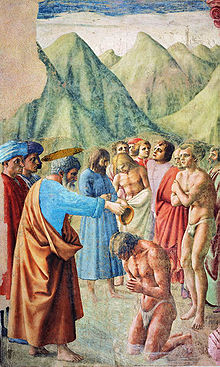'Tis extremely simple indeedeo ... google da words "John 3:5" ... and read!
This is what I found from your Wikipedia reference -always water Baptisms-
Baptism
From Wikipedia, the free encyclopedia
(Redirected from
Baptize)
Jump to:
navigation,
search
This article is about the Christian religious ceremony. For other uses, see
Baptism (disambiguation).


Baptism of Neophytes by
Masaccio, 15th century,
Brancacci Chapel,
Florence.[sup]
[1][/sup] Part of a series on
Christianity

Christians hold Jesus to be Christ
General topics[hide]
 Christianity portal
Baptism
Christianity portal
Baptism (from the
Greek noun Βάπτισμα
baptisma; itself derived from
baptismos, washing[sup]
[2][/sup]) is a
Christian rite of
admission (or
adoption[sup]
[3][/sup]), almost invariably with the use of water, into the
Christian Church generally[sup]
[4][/sup] and also a particular church tradition. Baptism has been called a
sacrament and an
ordinance of Jesus Christ.
In some traditions, baptism is also called christening,[sup]
[5][/sup][sup]
[6][/sup] but for others the word "christening" is reserved for the
baptism of infants.[sup]
[7][/sup]
The New Testament reports that
Jesus was baptized.[sup]
[8][/sup] The usual form of baptism among
the earliest Christians was for the naked[sup]
[9][/sup] candidate to be immersed totally (submersion) or partially (standing or kneeling in water while water was poured on him or her).[sup]
[10][/sup][sup]
[11][/sup][sup]
[12][/sup][sup]
[13][/sup][sup]
[14][/sup][sup]
[15][/sup][sup]
[16][/sup] While
John the Baptist's use of a deep river for his baptism suggests immersion,[sup]
[17][/sup] pictorial and archaeological evidence of Christian baptism from the 3rd century onward indicates that a normal form was to have the candidate stand in water while water was poured over the upper body.[sup]
[18][/sup][sup]
[19][/sup][sup]
[20][/sup][sup]
[21][/sup] Other common forms of baptism now in use include pouring water three times on the forehead.
Martyrdom was identified early in Church history as "baptism by blood", enabling martyrs who had not been baptized by water to be saved. Later, the Catholic Church identified a
baptism of desire, by which those preparing for baptism who die before actually receiving the
sacrament are considered saved.[sup]
[22][/sup] As evidenced also in the common Christian practice of
infant baptism, baptism was universally seen by Christians as in some sense necessary for
salvation, until
Huldrych Zwingli in the 16th century denied its necessity.[sup]
[23][/sup]
Today, some Christians, particularly
Quakers and the
Salvation Army, do not see baptism as necessary, and do not practice the rite. Among those that do, differences can be found in the manner and mode of baptizing and in the understanding of the significance of the rite. Most Christians baptize "in the name of the
Father, and of the
Son, and of the
Holy Spirit" (following the
Great Commission), but some baptize in
Jesus' name only. Most Christians
baptize infants;[sup]
[24][/sup] many others hold that only
believer’s baptism is true baptism. Some insist on submersion or at least partial immersion of the person who is baptized, others consider that any form of washing by water, as long as the water flows on the head, is sufficient.
"Baptism" has also been used to refer to any ceremony, trial, or experience by which a person is initiated, purified, or given a name[sup]
[25][/sup]—see
Other initiation ceremonies.
Contents
[
hide]





